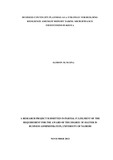| dc.contributor.author | Maina, Samson M | |
| dc.date.accessioned | 2013-03-01T06:14:40Z | |
| dc.date.issued | 2012-11 | |
| dc.identifier.uri | http://erepository.uonbi.ac.ke:8080/xmlui/handle/123456789/12731 | |
| dc.description.abstract | Disruptive events can cause extensive handicaps and serious threats to the ability of a
business to continue operating effectively. Whereas managers can do little to
influence the occurrence or lack thereof of “acts of God”, error or even sabotage, they
should make discrete business continuity plans to assure stakeholders of spontaneous
resumption of services and business processes if disruptive events occur. The ability
and capacity of an enterprise to withstand these disruptions and adapt to its own risk
environment is called enterprise resilience. A Business Continuity Plan (BCP) on the
other hand is a roadmap to the achievement of the desired level of enterprise
resilience. It is management’s plan for ensuring that the business organisation
continues to operate in the face of established adverse scenarios.
This study was undertaken to determine the extent of adoption of formal business
continuity planning practices amongst Kenya’s Licensed Deposit Taking
Microfinance Institutions (DTMs). The study also sought to establish the various
methods adopted by the DTMs to assure themselves of continuity of ICT systems,
people, facilities and finances. The study was conducted on all the six DTMs licensed
by the Central Bank of Kenya as at August 2012. Data was collected using
questionnaires and analysed. The questionnaires were specifically addressed to the
head of risk department for each of the DTMs.
The findings from this study indicate that the licensed deposit taking microfinance
institutions in Kenya have adopted formal business continuity planning. Further, the
study found that adoption of business continuity planning is positively correlated to
the priority given, management attitude, existence of technical capacity, knowledge of
the need for business continuity planning as well as the regulatory environment.
These findings are important because they give the regulator a view of the level of
resilience built into the DTMs which are currently holding very significant financial
portfolios in the economy. Further, the findings give the Kenyan citizens a view of the
long term security of their funds based on the proactive management of business
continuity risks amongst the DTMs. | en |
| dc.language.iso | en | en |
| dc.publisher | University of Nairobi | en |
| dc.subject | business continuity | en |
| dc.subject | planning | en |
| dc.subject | strategy for building resilience | en |
| dc.subject | deposit taking microfinance institutions in Kenya | en |
| dc.title | Business continuity planning as a strategy for building resilience amongst deposit taking microfinance institutions in Kenya | en |
| dc.type | Thesis | en |
| local.embargo.terms | 6 months | en |
| local.publisher | School Of Business, University Of Nairobi | en |

